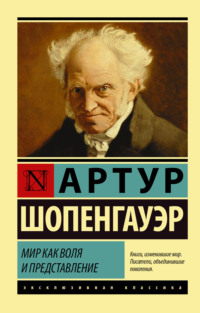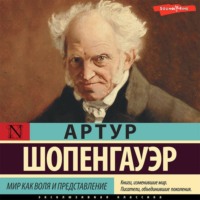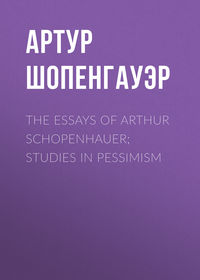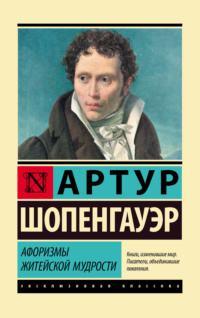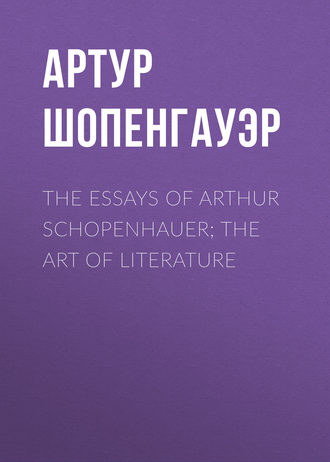 полная версия
полная версияThe Essays of Arthur Schopenhauer; The Art of Literature
Nor, again, is it exactly the pleasure it gives you; for this is almost outweighed by the greatness of the effort. It is rather a peculiar kind of instinct, which drives the man of genius to give permanent form to what he sees and feels, without being conscious of any further motive. It works, in the main, by a necessity similar to that which makes a tree bear its fruit; and no external condition is needed but the ground upon which it is to thrive.
On a closer examination, it seems as though, in the case of a genius, the will to live, which is the spirit of the human species, were conscious of having, by some rare chance, and for a brief period, attained a greater clearness of vision, and were now trying to secure it, or at least the outcome of it, for the whole species, to which the individual genius in his inmost being belongs; so that the light which he sheds about him may pierce the darkness and dullness of ordinary human consciousness and there produce some good effect.
Arising in some such way, this instinct drives the genius to carry his work to completion, without thinking of reward or applause or sympathy; to leave all care for his own personal welfare; to make his life one of industrious solitude, and to strain his faculties to the utmost. He thus comes to think more about posterity than about contemporaries; because, while the latter can only lead him astray, posterity forms the majority of the species, and time will gradually bring the discerning few who can appreciate him. Meanwhile it is with him as with the artist described by Goethe; he has no princely patron to prize his talents, no friend to rejoice with him:
Ein Fürst der die Talente schätzt, Ein Freund, der sich mit mir ergötzt, Die haben leider mir gefehlt.
His work is, as it were, a sacred object and the true fruit of his life, and his aim in storing it away for a more discerning posterity will be to make it the property of mankind. An aim like this far surpasses all others, and for it he wears the crown of thorns which is one day to bloom into a wreath of laurel. All his powers are concentrated in the effort to complete and secure his work; just as the insect, in the last stage of its development, uses its whole strength on behalf of a brood it will never live to see; it puts its eggs in some place of safety, where, as it well knows, the young will one day find life and nourishment, and then dies in confidence.
1
In their Hegel-gazette, commonly known as Jahrbücher der wissenschaftlichen Literatur.
2
Select examples of the art of writing in this style are to be found almost passim in the Jahrbücher published at Halle, afterwards called the Deutschen Jahrbücher.
3
King Henry IV., Part II. Act v. Sc. 3.
4
Works and Days, 40.
5
Translator's Note.– In the original, Schopenhauer here enters upon a lengthy examination of certain common errors in the writing and speaking of German. His remarks are addressed to his own countrymen, and would lose all point, even if they were intelligible, in an English translation. But for those who practice their German by conversing or corresponding with Germans, let me recommend what he there says as a useful corrective to a slipshod style, such as can easily be contracted if it is assumed that the natives of a country always know their own language perfectly.
6
Translator's Note.– It is a fact worth mentioning that the first twelve words of the Republic are placed in the exact order which would be natural in English.
7
Translator's Note.– This sentence in the original is obviously meant to illustrate the fault of which it speaks. It does so by the use of a construction very common in German, but happily unknown in English; where, however, the fault itself exists none the less, though in different form.
8
Cf. Thomae Hobbes vita: Carolopoli apud EleutheriumAnglicum, 1681, p. 22.
9
Translator's Note.– Tomas de Yriarte (1750-91), a Spanish poet, and keeper of archives in the War Office at Madrid. His two best known works are a didactic poem, entitled La Musica, and the Fables here quoted, which satirize the peculiar foibles of literary men. They have been translated into many languages; into English by Rockliffe (3rd edition, 1866). The fable in question describes how, at a picnic of the animals, a discussion arose as to which of them carried off the palm for superiority of talent. The praises of the ant, the dog, the bee, and the parrot were sung in turn; but at last the ostrich stood up and declared for the dromedary. Whereupon the dromedary stood up and declared for the ostrich. No one could discover the reason for this mutual compliment. Was it because both were such uncouth beasts, or had such long necks, or were neither of them particularly clever or beautiful? or was it because each had a hump? No! said the fox, you are all wrong. Don't you see they are both foreigners? Cannot the same be said of many men of learning?
10
Dunciad, iii, 194.
11
Faust, I. 329.
12
Translator's Note. – Schopenhauer refers to the cracking of whips. See the Essay On Noise in Studies in Pessimism.
13
Horace, Ars Poetica, 372.
14
Translator's Note. – Ernst Freiherr von Feuchtersleben (1806-49), an Austrian physician, philosopher, and poet, and a specialist in medical psychology. The best known of his songs is that beginning "Es ist bestimmt in Gottes Rath" to which Mendelssohn composed one of his finest melodies.
15
See especially §§ 35, 113, 118, 120, 122, 128.
16
A. Wivell: An Inquiry into the History, Authenticity, and Characteristics of Shakespeare's Portraits; with 21 engravings. London, 1836.
17
Ecclesiasticus, xi. 28.
18
Preface, p. xxix.
19
Welt als Wille, Vol. II. c. 37.
20
Collier, one of his critical editors, in his Introduction to the Sonettes, remarks upon this point: "In many of them are to be found most remarkable indications of self-confidence and of assurance in the immortality of his verses, and in this respect the author's opinion was constant and uniform. He never scruples to express it… and perhaps there is no writer of ancient or modern times who, for the quantity of such writings left behind him, has so frequently or so strongly declared that what he had produced in this department of poetry 'the world would not willingly let die.'"
21
Works and Days, 293.
22
The Prince, ch. 22.
23
Plutarch, Apophthegms.
24
Translator's Note. – August Mahlmann (1771-1826), journalist, poet and story-writer. His Herodes vor Bethlehem is a parody of Kotzebue's Hussiten vor Naumburg.
25
Translator's Note. – At this point Schopenhauer interrupts the thread of his discourse to speak at length upon an example of false fame. Those who are at all acquainted with the philosopher's views will not be surprised to find that the writer thus held up to scorn is Hegel; and readers of the other volumes in this series will, with the translator, have had by now quite enough of the subject. The passage is therefore omitted.
26
If the professors of philosophy should chance to think that I am here hinting at them and the tactics they have for more than thirty years pursued toward my works, they have hit the nail upon the head.
27
In the Venetian edition of 1492.
28
The correct scale for adjusting the hierarchy of intelligences is furnished by the degree in which the mind takes merely individual or approaches universal views of things. The brute recognizes only the individual as such: its comprehension does not extend beyond the limits of the individual. But man reduces the individual to the general; herein lies the exercise of his reason; and the higher his intelligence reaches, the nearer do his general ideas approach the point at which they become universal.
29
Translator's Note.– For an illustration of this feeling in poetry, Schopenhauer refers the reader to Byron's Prophecy of Dante: introd. to C. 4.
30
Opera: ed. Wagner, 1. 224.




